Du Fu Thatched Cottage
Du Fu Thatched Cottage (Chinese: 杜甫草堂; pinyin: Dù Fǔ Cǎotáng) is a 24-acre (97,000 m2) park and museum in honour of the Tang dynasty poet Du Fu at the western outskirts of Chengdu, adjacent to the Huanhua Xi (Flower Rinsing Creek). In 1961 the Chinese government established Du Fu Thatched Cottage as a National Heritage site.
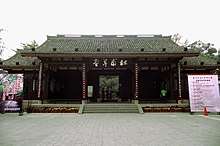 Entrance gate of Du Fu Thatched Cottage | |
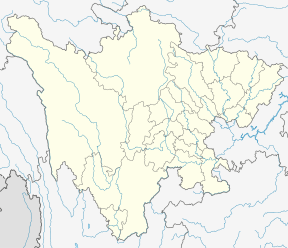 Location within Sichuan | |
| Location | Chengdu, Sichuan |
|---|---|
| Coordinates | 30°39′45″N 104°01′34″E |
| Website | Du Fu Thatched Cottage Museum website |
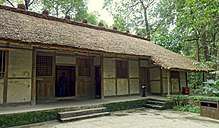
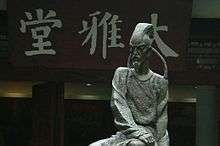
History
In 759 Du Fu moved to Chengdu, built a thatched hut near the Flower Rinsing Creek and lived there for four years. The "thatched hut" period was the peak of Du Fu's creativity, during which he wrote two hundred and forty poems, among them "My Thatched Hut was torn apart by Autumn Wind" and "The Prime Minister of Shu".
Du Fu Thatched Cottage is now a popular destination for Du Fu enthusiasts around the world to pay tribute to the poet.
Museum
The original thatched hut built by Du Fu was destroyed. Key buildings in the Du Fu Thatched Cottage park were constructed in the early 16th century during the Ming dynasty and extensively renovated in 1811 during the Qing dynasty.
Du Fu Thatched Cottage consists of several areas:
- Du Gongbu Memorial Hall (工部祠; Gōngbù Cí), where the life and work of Du Fu was displayed, the library area displayed published works of Du Fu, including some rare Song dynasty wood carving editions. The foreign-language section displays a large number of foreign language books of Du Fu's works.
- The thatched cottage of Du Fu. A reconstructed thatched hut partitioned into a study, a bedroom and kitchen, recreating the living and working environment of Du Fu's time.
- The Hall of Great Poets (大雅堂; Dàyǎ Táng). An exhibition hall with a 16 meter long by 4 meter tall mural painting portraying scenes from Du Fu's poems: "My Thatched Hut Wrecked by the Autumn Wind" and "A Song of War Chariots". There are also statues of twelve prominent Chinese poets (including Qu Yuan, Tao Qian, Li Bai, Wang Wei, Su Shi, Li Qingzhao, Lu You) on display.
Gallery
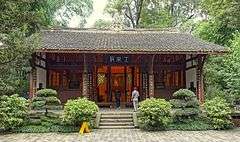 Gongbu Shrine in the Du Fu Thatched Cottage
Gongbu Shrine in the Du Fu Thatched Cottage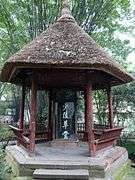 Shaoling Thatched Cottage Tablet Pavilion
Shaoling Thatched Cottage Tablet Pavilion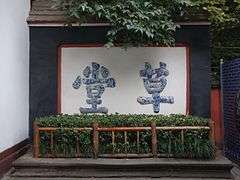
See also
- Chinese architecture
- Kuizhou, further location of Du Fu thatched cottage(s)
- List of museums
- Museums in China
References
External links
| Wikimedia Commons has media related to Du Fu Thatched Cottage. |
- Du Fu Thatched Cottage Museum website
- Image Gallery of Du Fu's Cottage and Museum
